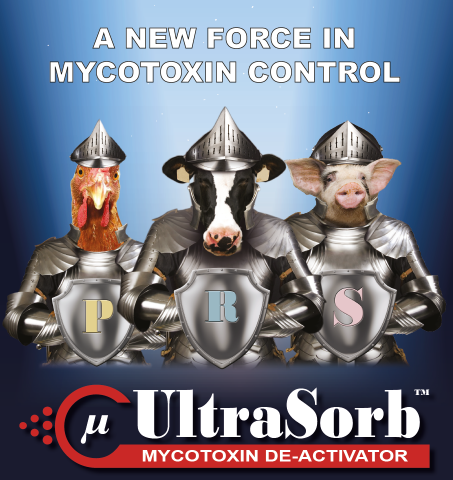
New species-specific mycotoxin deactivators
First Ever Species-specific Range Of Mycotoxin Deactivators Hits The Market
First ever species-specific range of mycotoxin deactivators hits the market
Micron Bio-Systems has launched a brand new range of species-specific mycotoxin deactivators that have been developed to more accurately target the differing mycotoxin threats and digestive physiology in poultry, swine and ruminants.
Ultrsorb P (poultry), Ultrasorb S (swine) and Ultrasorb R (ruminants) are all based on the highly effective Ultrasorb mycotoxin deactivator, and were developed following extensive research into the differing mycotoxin loads faced by individual species and the conditions under which mycotoxin deactivator activity is optimised.
“The conditions in the pig’s stomach and small intestine are very different to those in poultry or in the rumen, for example, yet mycotoxin deactivators have until now always been developed along a one-size-fits-all strategy,” states Micron Bio-Systems Technical Manager Liz Norton. “Modifications for different species were limited to simply adjusting dose rate to bodyweight.
“But what became clear from our research is that binding material efficacy varied considerably at the different pHs which occur in the gastro-intestinal tract (GIT) of different animal species. As a result, optimum efficacy was only achieved if the materials used were matched to the individual species.”
The mycotoxin threat faced by each species also differs. The Fusarium spp. mycotoxins fumonisin (FUM) and Zearalenone (ZON) are acutely toxic to pigs, for example, whilst the aflatoxins produced by Aspergillus spp. moulds pose the greatest threat to poultry. For ruminants, deoxynivalenol (DON) has been found to be present in 90% of maize silage samples.
“The new range of Ultrasorb deactivators retain Micron’s core transformation and degradation technology, so continues to be highly effective in tackling the non-polar mycotoxins like FUM and ZON which are extremely prevalent in all cereal-based livestock feeds,” Ms Norton continues.
“They also continue to be effective against the trichothecenes deoxynivalenol (DON) and T2 toxin, as well as the aflatoxins produced by Aspergillus spp. and other key mycotoxins damaging to livestock health and performance, such as the ochratoxins.
“In addition, Ultrasorb P, S and R each contain specific selected essential oils proven in independent trials to help combat the combined effects of mycotoxins and moulds within the GIT. Often overlooked, it’s an additional challenge that can considerably reduce overall feed efficiency.”
Ultrasorb P, S and R were developed by Micron Bio-Systems and is distributed in the UK by AB Vista. For more information, please call 02894 473 478 or visit www.abvista.com
Ends 384 words
Issued by Matthew Morton – MG Communications Limited 01264 735594 [email protected]

 9 years ago
9 years ago  1204 views
1204 views
